外研版高中英语必修二 Module 6 Films and TV Programmes Gramma Function副词课件 (共48张PPT)
文档属性
| 名称 | 外研版高中英语必修二 Module 6 Films and TV Programmes Gramma Function副词课件 (共48张PPT) | 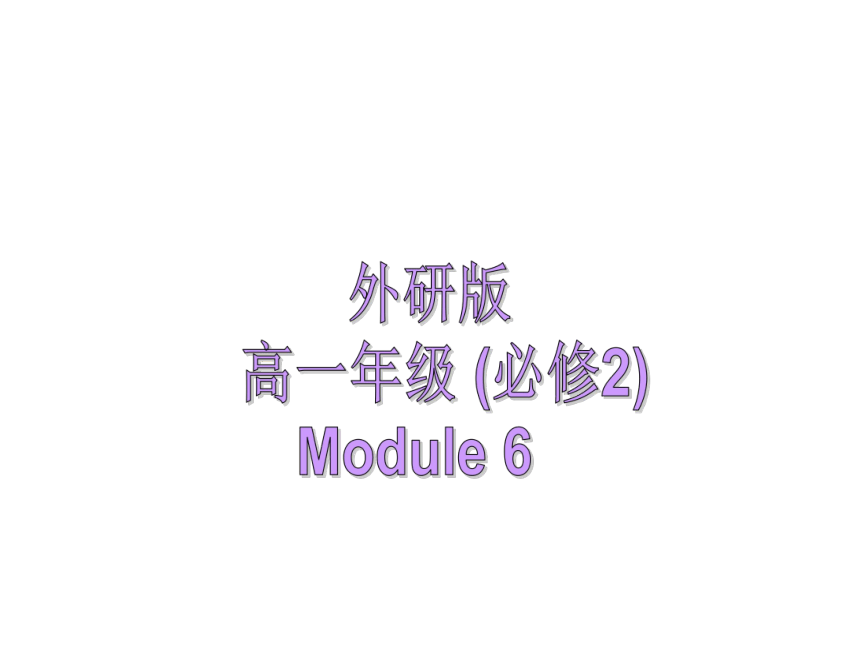 | |
| 格式 | zip | ||
| 文件大小 | 1.7MB | ||
| 资源类型 | 教案 | ||
| 版本资源 | 外研版 | ||
| 科目 | 英语 | ||
| 更新时间 | 2019-01-21 10:14:09 | ||
图片预览







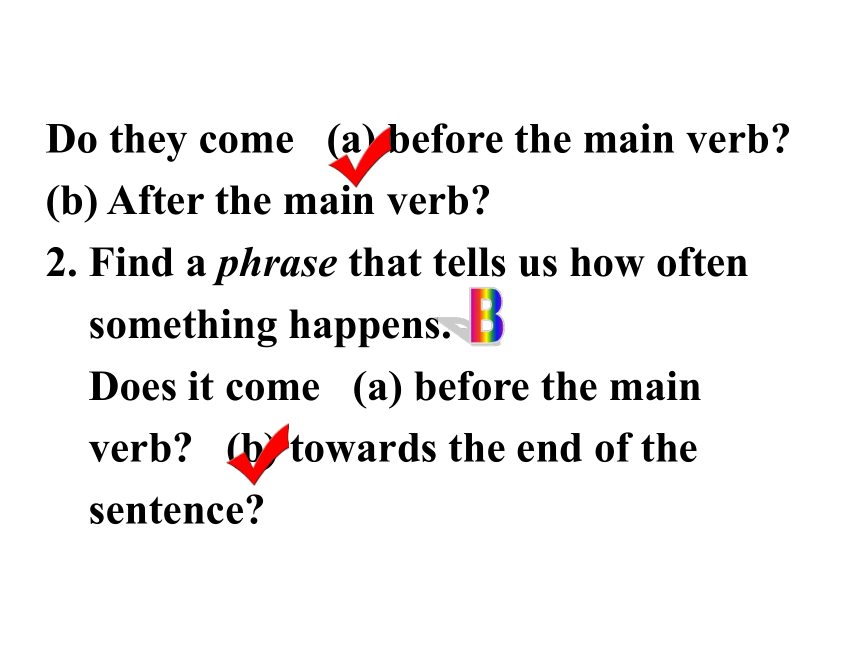
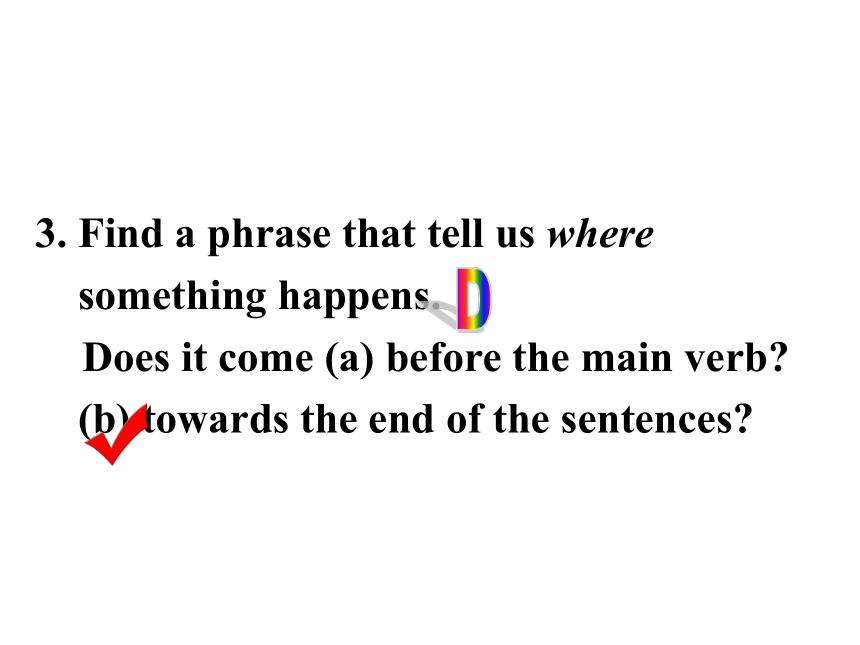
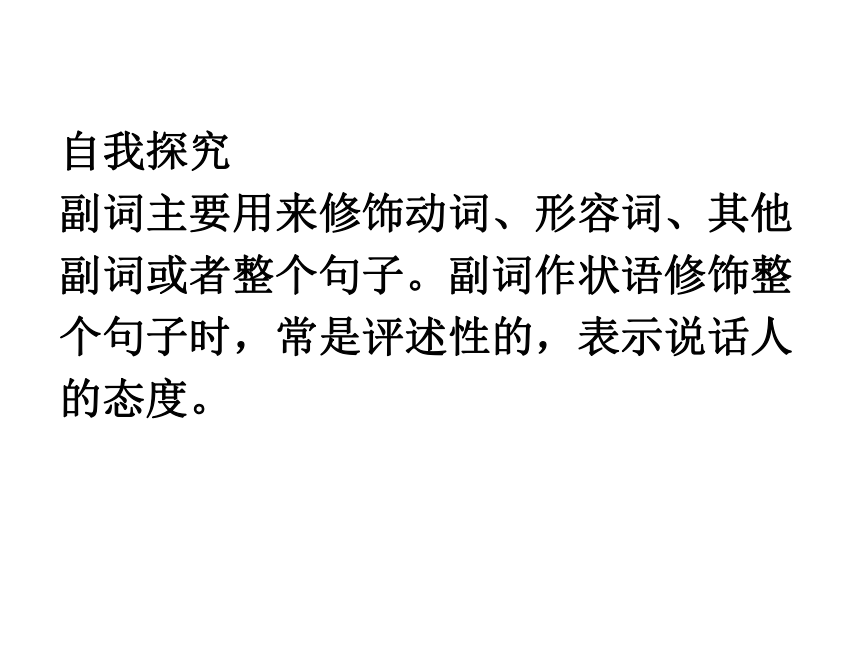
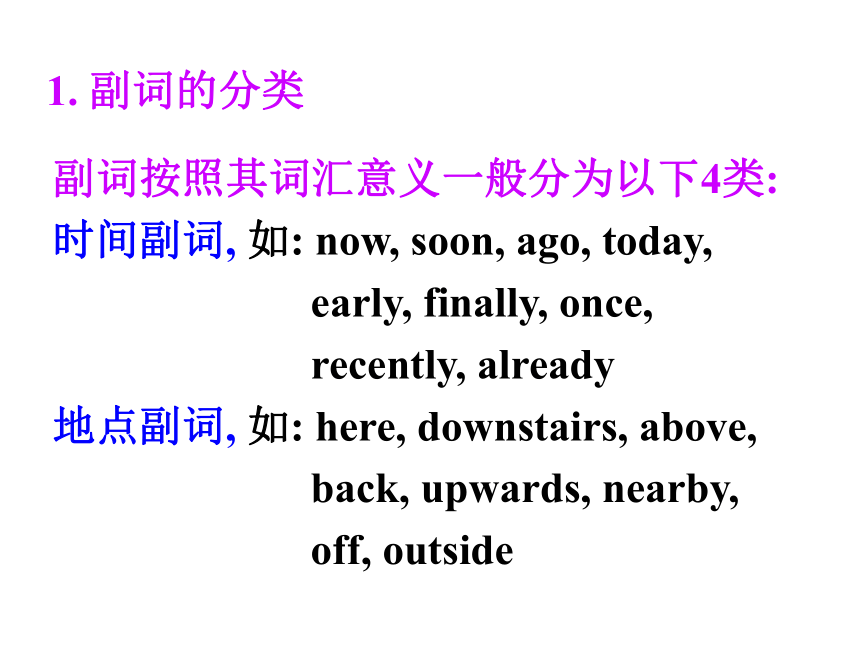
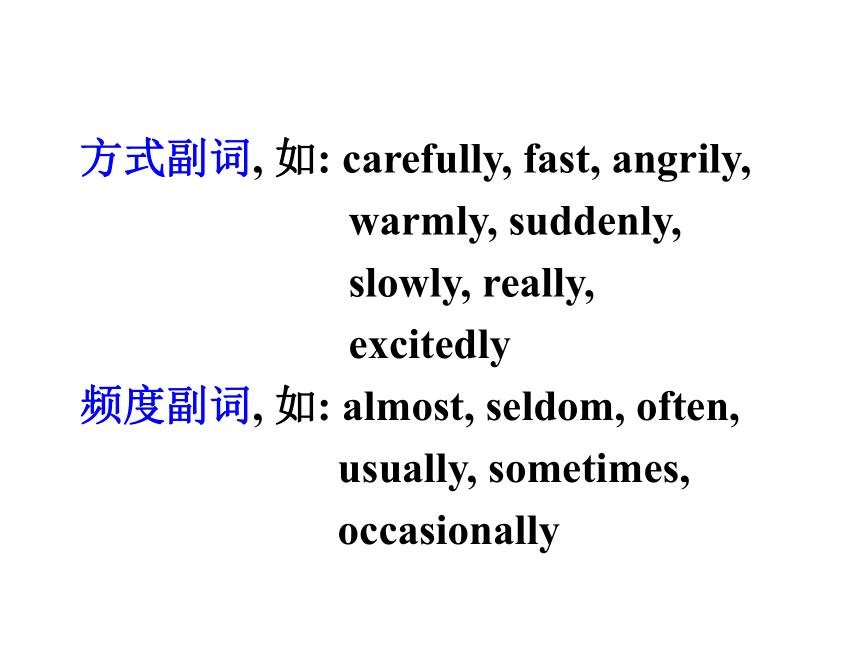
文档简介
课件48张PPT。 外研版
高一年级 (必修2)
Module 6Module 6 Films and TV ProgrammesGrammer & FunctionAdverbs of frequency and place1. To know about the kinds of adverbs,
especially adverbs of frequency and place
2. To learn about the correct order of
adverbs and adverbial phrases in the
sentence.
3. To learn how to express how often you do
thingsLook at the words in blue in these sentences.A Martial arts films are often enjoyable but they
are seldom great art.
B …characters leap through the air every now
and then…
C Films like this rarely reach the big screen.
D Wuxia films are popular in China.
E Ang Lee had never directed a martial arts
film before.
F It has occasionally been done.
G Do you often go to the cinema?1. Underline the single words that tell
us how often something happens.
With the verb to be, do these words
come (a) after is or are? (b) before
is or are?
Do these words come (a) before the
auxiliary verb? (b) after the
auxiliary verb?ACEFGDo they come (a) before the main verb?
(b) After the main verb?
2. Find a phrase that tells us how often
something happens.
Does it come (a) before the main
verb? (b) towards the end of the
sentence?B3. Find a phrase that tell us where
something happens.
Does it come (a) before the main verb?
(b) towards the end of the sentences?D自我探究
副词主要用来修饰动词、形容词、其他副词或者整个句子。副词作状语修饰整个句子时,常是评述性的,表示说话人的态度。1. 副词的分类 副词按照其词汇意义一般分为以下4类:
时间副词, 如: now, soon, ago, today,
early, finally, once,
recently, already
地点副词, 如: here, downstairs, above,
back, upwards, nearby,
off, outside方式副词, 如: carefully, fast, angrily,
warmly, suddenly,
slowly, really,
excitedly
频度副词, 如: almost, seldom, often,
usually, sometimes,
occasionally副词按照其句法功能, 一般分为以下4类: 疑问副词, 如: how, when, where, why放在特殊疑问句句首。
关系副词, 如: when, where, why, whether, 引导定语从句。
连接副词, 如: how, when, where, why, whether, 引导名词性从句。 2. 频度副词通常放在动词前面。如:
I hardly ever heard him singing. 我几乎从未听他唱过歌。
They occasionally saw him walking along the river bank. 他们偶尔看见他在河边散步。
He seldom went back to his hometown. 他很少回故乡去。如果句子里有情态动词、助动词或动词be, 就放在这类动词 (的第一个) 的后面。 如:
You must always keep this in mind. 这一点你要经常记在心里。
Do you often go to the cinema? 你经常去看电影吗?
He has never been late for the meeting. 他开会从不迟到。
She is seldom ill. 她很少生病。3. 疑问副词、连接副词、关系副词和一些形容这个句子的副词, 通常都放在句子(或从句) 的开头。如:
How do you like the book you bought yesterday? 昨天买的书你觉得怎么样?Obviously the taxi driver is to be blamed for the accident. 显然, 这位出租车司机应该为这起事故受到责备。
Certainly we should try our best to help this child. 我们的确应该尽力帮助这个孩子。4. 方式副词通常位于动词(和宾语)的后面。如:
She does everything carefully. 她做什么事都很细心。
In the end he passed the exam successfully. 最后, 他成功地通过了考试。
He is always treating other people rudely. 他待人总是很粗鲁。 Divide these phrases into two groups.1. words and phrases that tell us how
often something happens
2. phrases that tell us where something
happens occasionally, (every) now and then,
in the west (of the country),
three times a week, seldom,
from time to time, between the houses,
once a week, rarely,
at the end (of the road),
through the air, every two daysWhere:
in the west (of the country) / between the houses /at the end (of the road) /through the air How often:
occasionally/(every) now and then /three times a week/ seldom/ from time to time/once a week/rarely/ every two daysAdverbs and adverbial phrasesA. We always watch telly in the morning as we ear our breakfast in the kitchen.
B. I watch films all the time at the weekend.
C. I saw a brilliant one yesterday.
D. Everyone in it acts so brilliantly.Read the sentences and answer the questions.1. Is brilliant an adjective (describing a noun) or an adverb (telling you about a verb)?
adjective describing “one” (pronoun for “film”) 2. How do you make adverbs from
adjectives? Can you make an adverb
from the word quick?
You frequently add-ly to the end of
the adjective, e.g. quickly.3. Can you find words and phrases that answer these questions: When? Where? How?
When?: as we eat our breakfast; in the
morning; all the time; at the
weekend; yesterday
Where?: in the kitchen
How?: brilliantly Work in pairs. Look at the sentences below. What is the order of When? Where? How? Adverbs in these sentences?1. The child plays happily in his bedroom every evening.
how? (happily) where? (in his bedroom) when? (every evening)2. Mrs Wang cleaned the house carefully yesterday.
how? (carefully) when? (yesterday)
3. The students wait quietly at the bus stop each day.
how? (quietly) where? (at the bus stop) when? (each day)几个副词同时出现在一个句子中, 一般
的次序是: 方式副词+地点副词+时间
副词 (时间副词也可置于句首)。如:
He was born in Beijing in the year 1980.
他1980年出生在北京。
They were all working hard in the fields
at 10:00 yesterday.
昨天10点的时候他们正在田野里辛勤劳动。该次序也适用于由其他词或词组组成的相应的状语, 即: 方式状语+地点状语+时间状语。如:
Uncle Tom died suddenly in Paris in 1980. 汤姆叔叔于1980年突然在巴黎去世。
After the war, the hero returned with pride to his hometown. 战后, 那位英雄自豪地返回了家乡。Work in pairs. Put the words in the sentences below in the correct order.a I of supermarket at yesterday spent lot money the
I spent a lot of money at the supermarket yesterday. 2. street walked down man the
quickly the
The man walked quickly down the
street.
3. well you yesterday played
You played well yesterday.4. worked today student hard the have
The students have worked hard today.
5. her before carefully talk think you to
Think carefully before you talk to her.6. the were loudly yesterday boys corridor the talking in
The boys were talking loudly in the corridor yesterday.
7. in to drove morning airport they early the
They drove to the airport early in the morning. Talking about how often you do thingsFunctionchat show comedy programme quiz show soap (opera) sports programme
the news TV/radio dramaMatch the types of TV and radio pragrammes with the definitions.A. a programme in which famous people talk about themselves and their work
B. a programme in which people have to answer questions correctly
C. a program that tells you about recent eventsD. an interesting and exciting story with actors playing different parts, written for TV or radio
E. a program about the ordinary lives of the same group pf people that is shown once or twice a weekA. _________
B. _________
C. _________
D. ______________
E. __________chat show quiz show the news TV/radio drama soap opera Use the words and phrases below to say how often you watch the different types of programmes in activity 1. I rarely watch soap operas.
I watch the news about four times a week.seldom rarely occasionally
every now and then often sometimes once a week every day (four)times a week from time to time every two days twice a month I. 选用括号内合适的单词填空。
1. We received a letter from him
________ (recent / recently).
2. Most doctors think ________ (deep /
deeply) about what their patients want.
3. You’ll just have to be ________
(patient / patiently) and wait till I’m
off the phone. recentlydeeplypatient4. He has ________ (frequent / frequently)
been compared to Michael Jackson.
5. His visits became less ________
(frequent / frequently) as time passed.
6. ________ (Actual / Actually), on
second thoughts, I don’t think I want
to go out tonight. frequentlyfrequent Actually II. 根据括号内的提示翻译下面句子。
1. 延迟半小时以后演出终于开始了。 (finally)
________________________________________________
2. 奶奶生病住院了,所以我每周去看她两次。 (twice a week)
__________________________________________________________________________The performance finally started half an hour late. Grandma was ill in hospital, so I went to see her twice a week. 3. 一开始下雨, 我们就跑进屋里了。 (indoors)
__________________________________________________________________________
4. 他们的车更大,因此更加舒适。 (therefore)
__________________________________________________________________________As soon as it began to rain, we ran indoors. Their car is bigger and therefore more comfortable. 1. Remember the rules in the lesson.
2. Finish the exercises on page 97 in the workbook.
高一年级 (必修2)
Module 6Module 6 Films and TV ProgrammesGrammer & FunctionAdverbs of frequency and place1. To know about the kinds of adverbs,
especially adverbs of frequency and place
2. To learn about the correct order of
adverbs and adverbial phrases in the
sentence.
3. To learn how to express how often you do
thingsLook at the words in blue in these sentences.A Martial arts films are often enjoyable but they
are seldom great art.
B …characters leap through the air every now
and then…
C Films like this rarely reach the big screen.
D Wuxia films are popular in China.
E Ang Lee had never directed a martial arts
film before.
F It has occasionally been done.
G Do you often go to the cinema?1. Underline the single words that tell
us how often something happens.
With the verb to be, do these words
come (a) after is or are? (b) before
is or are?
Do these words come (a) before the
auxiliary verb? (b) after the
auxiliary verb?ACEFGDo they come (a) before the main verb?
(b) After the main verb?
2. Find a phrase that tells us how often
something happens.
Does it come (a) before the main
verb? (b) towards the end of the
sentence?B3. Find a phrase that tell us where
something happens.
Does it come (a) before the main verb?
(b) towards the end of the sentences?D自我探究
副词主要用来修饰动词、形容词、其他副词或者整个句子。副词作状语修饰整个句子时,常是评述性的,表示说话人的态度。1. 副词的分类 副词按照其词汇意义一般分为以下4类:
时间副词, 如: now, soon, ago, today,
early, finally, once,
recently, already
地点副词, 如: here, downstairs, above,
back, upwards, nearby,
off, outside方式副词, 如: carefully, fast, angrily,
warmly, suddenly,
slowly, really,
excitedly
频度副词, 如: almost, seldom, often,
usually, sometimes,
occasionally副词按照其句法功能, 一般分为以下4类: 疑问副词, 如: how, when, where, why放在特殊疑问句句首。
关系副词, 如: when, where, why, whether, 引导定语从句。
连接副词, 如: how, when, where, why, whether, 引导名词性从句。 2. 频度副词通常放在动词前面。如:
I hardly ever heard him singing. 我几乎从未听他唱过歌。
They occasionally saw him walking along the river bank. 他们偶尔看见他在河边散步。
He seldom went back to his hometown. 他很少回故乡去。如果句子里有情态动词、助动词或动词be, 就放在这类动词 (的第一个) 的后面。 如:
You must always keep this in mind. 这一点你要经常记在心里。
Do you often go to the cinema? 你经常去看电影吗?
He has never been late for the meeting. 他开会从不迟到。
She is seldom ill. 她很少生病。3. 疑问副词、连接副词、关系副词和一些形容这个句子的副词, 通常都放在句子(或从句) 的开头。如:
How do you like the book you bought yesterday? 昨天买的书你觉得怎么样?Obviously the taxi driver is to be blamed for the accident. 显然, 这位出租车司机应该为这起事故受到责备。
Certainly we should try our best to help this child. 我们的确应该尽力帮助这个孩子。4. 方式副词通常位于动词(和宾语)的后面。如:
She does everything carefully. 她做什么事都很细心。
In the end he passed the exam successfully. 最后, 他成功地通过了考试。
He is always treating other people rudely. 他待人总是很粗鲁。 Divide these phrases into two groups.1. words and phrases that tell us how
often something happens
2. phrases that tell us where something
happens occasionally, (every) now and then,
in the west (of the country),
three times a week, seldom,
from time to time, between the houses,
once a week, rarely,
at the end (of the road),
through the air, every two daysWhere:
in the west (of the country) / between the houses /at the end (of the road) /through the air How often:
occasionally/(every) now and then /three times a week/ seldom/ from time to time/once a week/rarely/ every two daysAdverbs and adverbial phrasesA. We always watch telly in the morning as we ear our breakfast in the kitchen.
B. I watch films all the time at the weekend.
C. I saw a brilliant one yesterday.
D. Everyone in it acts so brilliantly.Read the sentences and answer the questions.1. Is brilliant an adjective (describing a noun) or an adverb (telling you about a verb)?
adjective describing “one” (pronoun for “film”) 2. How do you make adverbs from
adjectives? Can you make an adverb
from the word quick?
You frequently add-ly to the end of
the adjective, e.g. quickly.3. Can you find words and phrases that answer these questions: When? Where? How?
When?: as we eat our breakfast; in the
morning; all the time; at the
weekend; yesterday
Where?: in the kitchen
How?: brilliantly Work in pairs. Look at the sentences below. What is the order of When? Where? How? Adverbs in these sentences?1. The child plays happily in his bedroom every evening.
how? (happily) where? (in his bedroom) when? (every evening)2. Mrs Wang cleaned the house carefully yesterday.
how? (carefully) when? (yesterday)
3. The students wait quietly at the bus stop each day.
how? (quietly) where? (at the bus stop) when? (each day)几个副词同时出现在一个句子中, 一般
的次序是: 方式副词+地点副词+时间
副词 (时间副词也可置于句首)。如:
He was born in Beijing in the year 1980.
他1980年出生在北京。
They were all working hard in the fields
at 10:00 yesterday.
昨天10点的时候他们正在田野里辛勤劳动。该次序也适用于由其他词或词组组成的相应的状语, 即: 方式状语+地点状语+时间状语。如:
Uncle Tom died suddenly in Paris in 1980. 汤姆叔叔于1980年突然在巴黎去世。
After the war, the hero returned with pride to his hometown. 战后, 那位英雄自豪地返回了家乡。Work in pairs. Put the words in the sentences below in the correct order.a I of supermarket at yesterday spent lot money the
I spent a lot of money at the supermarket yesterday. 2. street walked down man the
quickly the
The man walked quickly down the
street.
3. well you yesterday played
You played well yesterday.4. worked today student hard the have
The students have worked hard today.
5. her before carefully talk think you to
Think carefully before you talk to her.6. the were loudly yesterday boys corridor the talking in
The boys were talking loudly in the corridor yesterday.
7. in to drove morning airport they early the
They drove to the airport early in the morning. Talking about how often you do thingsFunctionchat show comedy programme quiz show soap (opera) sports programme
the news TV/radio dramaMatch the types of TV and radio pragrammes with the definitions.A. a programme in which famous people talk about themselves and their work
B. a programme in which people have to answer questions correctly
C. a program that tells you about recent eventsD. an interesting and exciting story with actors playing different parts, written for TV or radio
E. a program about the ordinary lives of the same group pf people that is shown once or twice a weekA. _________
B. _________
C. _________
D. ______________
E. __________chat show quiz show the news TV/radio drama soap opera Use the words and phrases below to say how often you watch the different types of programmes in activity 1. I rarely watch soap operas.
I watch the news about four times a week.seldom rarely occasionally
every now and then often sometimes once a week every day (four)times a week from time to time every two days twice a month I. 选用括号内合适的单词填空。
1. We received a letter from him
________ (recent / recently).
2. Most doctors think ________ (deep /
deeply) about what their patients want.
3. You’ll just have to be ________
(patient / patiently) and wait till I’m
off the phone. recentlydeeplypatient4. He has ________ (frequent / frequently)
been compared to Michael Jackson.
5. His visits became less ________
(frequent / frequently) as time passed.
6. ________ (Actual / Actually), on
second thoughts, I don’t think I want
to go out tonight. frequentlyfrequent Actually II. 根据括号内的提示翻译下面句子。
1. 延迟半小时以后演出终于开始了。 (finally)
________________________________________________
2. 奶奶生病住院了,所以我每周去看她两次。 (twice a week)
__________________________________________________________________________The performance finally started half an hour late. Grandma was ill in hospital, so I went to see her twice a week. 3. 一开始下雨, 我们就跑进屋里了。 (indoors)
__________________________________________________________________________
4. 他们的车更大,因此更加舒适。 (therefore)
__________________________________________________________________________As soon as it began to rain, we ran indoors. Their car is bigger and therefore more comfortable. 1. Remember the rules in the lesson.
2. Finish the exercises on page 97 in the workbook.
